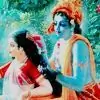

It is believed that by observing Amalaki Ekadasi, a devotee attains Moksha and washes away all the sins committed. Special pujas and offerings are made of Amalaki Tree (also known as amla and Indian gooseberry)and Lord Parashurama on the day.
There are numerous folk tales and stories in Puranas that extols the greatness of Amalaki Ekadasi. Most devotees fast on the day and keep vigil in the night. Those people observing partial fasting abstain from food items made from beans, pulses and grains, especially rice. (It is believed that demon Mura found a dwelling place in the rice and Lord Vishnu appeared in the form of Ekadasi to annihilate Mura. Therefore devotees who fast on the Ekadashi day avoid food made from grains.)

Amalaki Ekadasi Vrat Katha
from Brahmanda Puran
King Mandhata once said to Vasishtha Muni, "O great sage, kindly be merciful to me and tell me of a holy fast that will benefit me eternally."
Vasishtha Muni replied. "O king, kindly listen as I describe the best of all fast days, Amalaki Ekadashi. He who faithfully observes a fast on this Ekadashi obtains enormous wealth, gets free of the effects of all kinds of sins, and attains liberation. Fasting on this Ekadashi is more purifying than donating one thousand cows in charity to a pure brahmana. So please hear me attentively as I tell you the story of a hunter who, though daily engaged in killing innocent animals for his living, achieved liberation by observing a fast on Amalaki Ekadashi and following the prescribed rules and regulations of worship."
"There was once a kingdom named Vaidisha, where all the brahmanas, kshatriyas, vaishyas, and shudras were equally endowed with Vedic knowledge, great bodily strength, and fine intelligence. Oh lion among kings, the whole kingdom was full of Vedic sounds, not a single person was atheistic, and no one sinned. The ruler of this kingdom was King Pashabinduka, a member of the dynasty of Soma, the moon. He was also known as Chitraratha and was very religious and truthful. It is said that King Chitraratha had the strength of ten thousand elephants and that he was very wealthy and knew the six branches of Vedic wisdom perfectly."
"In this way, O best of kings, the citizens of Vaidisha lived many long years in great happiness and prosperity. Giving up all varieties of materialistic religion, they completely dedicated themselves to the loving service of the Supreme Lord, Hari."
"After bathing in the river, the king and all his subjects went to the temple of Lord Vishnu, where an Amalaki tree grew. First the king and his leading sages offered the tree a pot filled with water and aromatic incense. Then they worshiped Lord Parashurama (another form of Lord Vishnu) with these prayers: 'Oh Lord Parashurama, Oh son of Renuka, Oh all-pleasing one, Oh liberator of the worlds, kindly come beneath this holy Amalaki tree and accept our humble obeisances.'
Then they prayed to the Amalaki tree: 'Oh Amalaki, Oh offspring of Lord Brahma, you can destroy all kinds of sinful reactions. Please accept our respectful obeisances and these bumble gifts. O Amalaki, you are actually the form of Brahman, and Lord Ramachandra Himself once worshiped you. Whoever circumambulates you is therefore immediately freed of all his sins.'
"After offering these excellent prayers, King Chitraratha and his subjects remained awake throughout the night, praying and worshiping according to the regulations governing a sacred Ekadashi fast. It was during this auspicious time of fasting and prayer that a very irreligious man approached the assembly, a man who maintained himself and his family by killing animals. Burdened with both fatigue and sin, the hunter saw the king and the citizens of Vaidisha observing Amalaki Ekadashi by performing an all-night vigil, fasting, and worshiping Lord Vishnu in the beautiful forest setting, which was brilliantly illuminated by many lamps. The hunter hid nearby, wondering what this extraordinary sight before him was."
"Soon after sunrise, the king and his royal retinue - including the court sages and all the citizens -
completed their observance of Ekadashi and returned to the city of Vaidisha. The hunter then returned to his hut and happily ate his meal. In due time the hunter died, but the merit he had gained by fasting on Amalaki Ekadashi and hearing the glorification of the Supreme Personality of Godhead, as well as by being forced to stay awake all night, made him eligible to be reborn as a great king endowed with may chariots, elephants, horses, and soldiers. His name was Vasuratha, the son of King Viduratha, and he ruled over the kingdom of Jayanti."
"Just then the king awoke, and seeing all the dead tribesmen lying around him, he was astonished. He wondered, 'These are all great enemies of mine! Who has slain them so violently? Who is my great benefactor?'
"At that very moment he heard a voice from the sky: 'You ask who helped you. Well, who is that
person who alone can help anyone is distress? He is none other than Sri Keshava, the Supreme
Personality of Godhead, He who saves all who take shelter of Him without any selfish motive.'
"Upon hearing these words, King Vasuratha became over-whelmed with love for the Personality of Godhead Shri Keshava (Krishna). He returned to his capital city and ruled there like a second Lord Indra (king of the heavenly regions), without any obstacles at all. "Therefore, Oh King Mandhata," the venerable Vasishtha Muni concluded, "...anyone who observes this holy Amalaki Ekadashi will undoubtedly attain the supreme abode of Lord Vishnu, so great is the religious merit earned from the observance of this most sacred fast day."
Thus ends the narration of the glories of Amalaki Ekadashi, from the sacred Brahmanda Purana.























